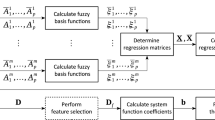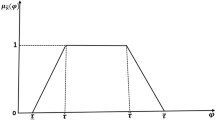Abstract
In this paper, a quadratic interpolation technique is proposed to minimize a univariable fuzzy-number-valued function. The fuzzy max-ordering relation of fuzzy numbers is used for optimal solution concept. The Hausdorff distance and Hukuhara difference between two fuzzy numbers, and the Hukuhara differentiability of fuzzy functions, are employed in order to derive the quadratic interpolation method. Convergence rates of the proposed two points and three points quadratic interpolation techniques are also analyzed. A numerical example is included to illustrate the proposed techniques.

Similar content being viewed by others
References
Bellman, R.E., Zadeh, L.A.: Decision making in a fuzzy environment. Manag. Sci. 17, B141–B164 (1970)
Chalco-Cano, Y., Silva, G.N., Rufian-Lizana, A.: On the Newton method for solving fuzzy optimization problems. Fuzzy Sets Syst. 272, 60–69 (2015)
Lai, Y.-J., Hwang, C.-L.: Fuzzy Mathematical Programming: Methods and Applications. Lecture Notes in Economics and Mathematical Systems, vol. 394. Springer, New York (1992)
Lai, Y.-J., Hwang, C.-L.: Fuzzy Multiple Objective Decision Making: Methods and Applications. Lecture Notes in Economics and Mathematical Systems, vol. 404. Springer, New York (1994)
Lodwick, W. A., Kacprzyk, J.: Fuzzy Optimization: Recent Advances and Applications. Studies in Fuzziness and Soft Computing, vol. 254. Physica-Verlag, New York (2010)
Słowínski, R. (ed.): Fuzzy Sets in Decision Analysis, Operations Research and Statistics. Kluwer, Boston (1998)
Cadenas, J.M., Verdegay, J.L.: Towards a new strategy for solving fuzzy optimization problems. Fuzzy Optim. Decis. Mak. 8, 231–244 (2009)
Wu, H.-C.: Duality theory in fuzzy linear programming problems with fuzzy coefficients. Fuzzy Optim. Decis. Mak. 2, 61–73 (2003)
Wu, H.-C.: Duality theory in fuzzy optimization problems. Fuzzy Optim. Decis. Mak. 3, 345–365 (2004)
Wu, H.-C.: Duality theory in fuzzy optimization problems formulated by the Wolfe’s primal and dual pair. Fuzzy Optim. Decis. Mak. 6, 179–198 (2007)
Zhong, Y., Shi, Y.: Duality in fuzzy multi-criteria and multi-constraint level linear programming: a parametric approach. Fuzzy Sets Syst. 132, 335–346 (2002)
Cheng, Z.: Duality theory in fuzzy mathematical programming problems with fuzzy coefficients. Comput. Math. Appl. 49, 1709–1730 (2005)
Ghosh, D., Chakraborty, D.: Analytical fuzzy plane geometry I. Fuzzy Sets Syst. 209, 66–83 (2012)
Chakraborty, D., Ghosh, D.: Analytical fuzzy plane geometry II. Fuzzy Sets Syst. 243, 84–109 (2014)
Ghosh, D., Chakraborty, D.: Analytical fuzzy plane geometry III. Fuzzy Sets Syst. 283, 83–107 (2016)
Ghosh, D., Chakraborty, D.: A new method to obtain fuzzy Pareto set of fuzzy multi-criteria optimization problems. Int. J. Intell. Fuzzy Syst. 26, 1223–1234 (2014)
Ghosh, D., Chakraborty, D.: A method for capturing the entire fuzzy non-dominated set of a fuzzy multi-criteria optimization problem. Fuzzy Sets Syst. 272, 1–29 (2015)
Ghosh, D., Chakraborty, D.: Fuzzy ideal cone: a method to obtain complete fuzzy non-dominated set of fuzzy multi-criteria optimization problems with fuzzy parameters. In: Proceedings of IEEE International Conference on Fuzzy Systems 2013, FUZZ IEEE 2013, IEEE Xplore, pp. 1–8
Gong, Z.-T., Li, H.-X.: Saddle point optimality conditions in fuzzy optimization problems. In: Cao, B.-Y., Zhang, C.-Y., Li, T.-F. (eds.) Fuzzy Info. and Engineering, pp. 7–14 . Springer, ASC 54 (2009)
Wu, H.-C.: Saddle point optimality conditions in fuzzy optimization problems. Fuzzy Optim. Decis. Mak. 3, 261–273 (2003)
Nocedal, J., Wright, S.J.: Numerical Optimization, 2nd edn. Springer, New York (2006)
Andrei, N.: Hybrid conjugate gradient algorithm for unconstrained optimization. J. Optim. Theory Appl. 141, 249–264 (2009)
Zeng, L.C., Schaible, S., Yao, J.C.: Hybrid steepest descent methods for zeros of nonlinear operators with applications to variational inequalities. J. Optim. Theory Appl. 141, 75–91 (2009)
Pirzada, U.M., Pathak, V.D.: Newton method for solving the multi-variable fuzzy optimization problem. J. Optim. Theory Appl. 156, 867–881 (2013)
Hall, K.R., Hull, D.G.: Interpolation in numerical optimization. AIAA J. 13(2), 231–232 (1975)
Wenyu, S., Yuan, Y.-X.: Optimization Theory and Methods: Nonlinear Programming, vol. 1. Springer, New York (2006)
Bazaraa, M.S., Sherali, H.D., Shetty, C.M.: Nonlinear Programming: Theory and Algorithms. Wiley, Hoboken (2006)
Giannessi, F.: Theorems of the alternative and optimality conditions. J. Optim. Theory Appl. 42(3), 331–365 (1984)
Ramík, J.: Optimal solutions in optimization problem with objective function depending on fuzzy parameters. Fuzzy Sets Syst. 158, 1873–1881 (2007)
Dubois, D., Prade, H.: Towards fuzzy differential calculus part 3: differentiation. Fuzzy Sets Syst. 8(3), 225–233 (1982)
Goetschel, R., Voxman, W.: Elementary fuzzy calculus. Fuzzy Sets Syst. 18(1), 31–43 (1986)
Banks, H.T., Jacobs, M.Q.: A differential calculus for multifunctions. J. Math. Anal. Appl. 29, 246–272 (1970)
Puri, M.L., Ralescu, D.A.: Differentials of fuzzy functions. J. Math. Anal. Appl. 91(2), 552–558 (1983)
Anastassiou, G.A.: Fuzzy Mathematics: Approximation Theory, vol. 251. Springer, New York (2010)
Wu, C., Song, S., Lee, S.S.: Approximate solutions, existence and uniqueness of the Cauchy problem of fuzzy differential equations. J. Math. Anal. Appl. 202, 629–644 (1996)
Bede, B., Stefanini, L.: Generalized differentiability of fuzzy-valued functions. Fuzzy Sets Syst. 230, 119–141 (2013)
Bede, B., Gal, S.G.: Generalizations of the differentiability of fuzzy-number-valued functions with applications to fuzzy differential equations. Fuzzy Sets Syst. 151(3), 581–599 (2005)
Wu, H.-C.: The Karush–Kuhn–Tucker optimality conditions for the optimization problem with fuzzy-valued objective function. Math. Methods Oper. Res. 66(2), 203–224 (2007)
Wu, H.-C.: The optimality conditions for optimization problems with fuzzy-valued objective functions. Optimization 57, 473–489 (2008)
Wu, H.-C.: The optimality conditions for optimization problems with convex constraints and multiple fuzzy-valued objective functions. Fuzzy Optim. Dec. Mak. 8(3), 295–321 (2009)
Pirzada, U.M., Pathak, V.D.: Newton method for solving the multi-variable fuzzy optimization problem. J. Optim. Theory Appl. 156(3), 867–881 (2013)
Ramík, J., Rimanek, J.: Inequality relation between fuzzy numbers and its use in fuzzy optimization. Fuzzy Sets Syst. 16(2), 123–138 (1985)
Lee-Kwang, H., Lee, J.-H.: A method for ranking fuzzy numbers and its application to decision-making. IEEE Trans. Fuzzy Syst. 7(6), 677–685 (1999)
Cheng, C.-H.: A new approach for ranking fuzzy numbers by distance method. Fuzzy Sets Syst. 95, 307–317 (1998)
Yager, R.R., Dimitar, F.: On ranking fuzzy numbers using valuations. Int. J. Intel. Syst. 14, 1249–1268 (1999)
Wang, X., Kerre, E.E.: Reasonable properties for the ordering of fuzzy quantities. Fuzzy Sets Syst. 118, 375–385 (2001)
Mitchell, H.B., Schaefer, P.A.: On ordering fuzzy numbers. Int. J. Intel. Syst. 15, 981–993 (2000)
Sun, H., Wu, J.: A new approach for ranking fuzzy numbers based on fuzzy simulation analysis method. Appl. Math. Comput. 174(1), 755–767 (2006)
Peng, J., Liu, H., Gang, S.: Ranking fuzzy variables in terms of credibility measure. In: Wang, L., Jiao, L., Shi, G., Liu, J. (eds.) Fuzzy Systems Knowledge Discovery, vol. 4223, pp. 217–220. Springer, New York (2006)
Yao, J.S., Wu, K.: Ranking fuzzy numbers based on decomposition principle and signed distance. Fuzzy Sets Syst. 116, 275–288 (2000)
Wang, Z.-X., Liu, Y.-L., Fan, Z.-P., Feng, B.: Ranking L–R fuzzy number based on deviation degree. Inform. Sci. 179, 2070–2077 (2009)
Zimmermann, H.J.: Fuzzy Set Theory and Its Applications. Springer, New York (2001)
Acknowledgments
We are really grateful to the anonymous reviewers and the editors for their constructive comments and valuable suggestions. The first author gratefully acknowledges financial support from the Outstanding Potential for Excellence in Research and Academics Award and from the Research Initiation Grant (BITS/GAU/RIG/53), BITS Pilani, Hyderabad Campus, India. The second author acknowledges the financial support given by the Department of Science and Technology, Government of India (SR/S4/M: 497/07).
Author information
Authors and Affiliations
Corresponding author
Rights and permissions
About this article
Cite this article
Ghosh, D., Chakraborty, D. Quadratic Interpolation Technique to Minimize Univariable Fuzzy Functions. Int. J. Appl. Comput. Math 3, 527–547 (2017). https://doi.org/10.1007/s40819-015-0123-x
Published:
Issue Date:
DOI: https://doi.org/10.1007/s40819-015-0123-x




